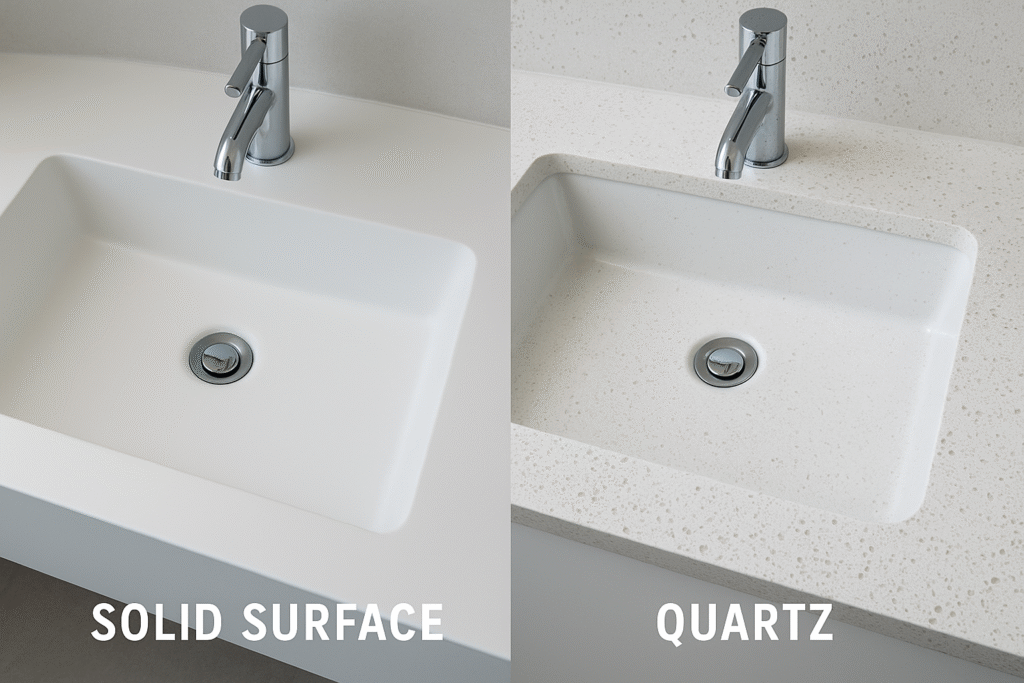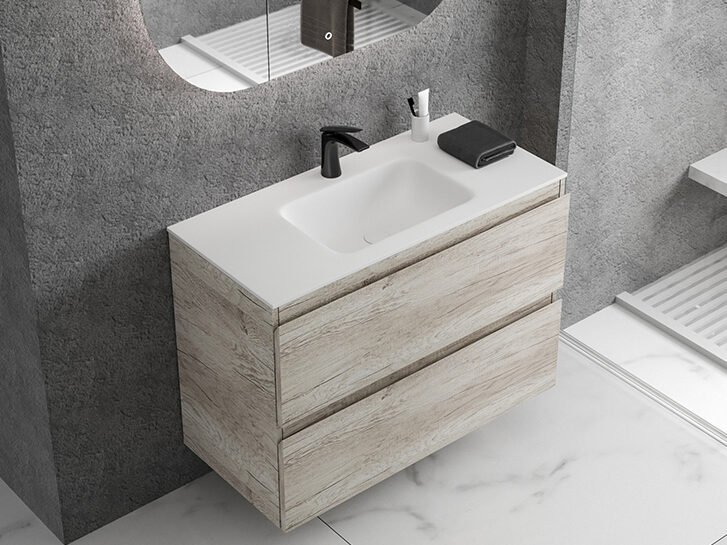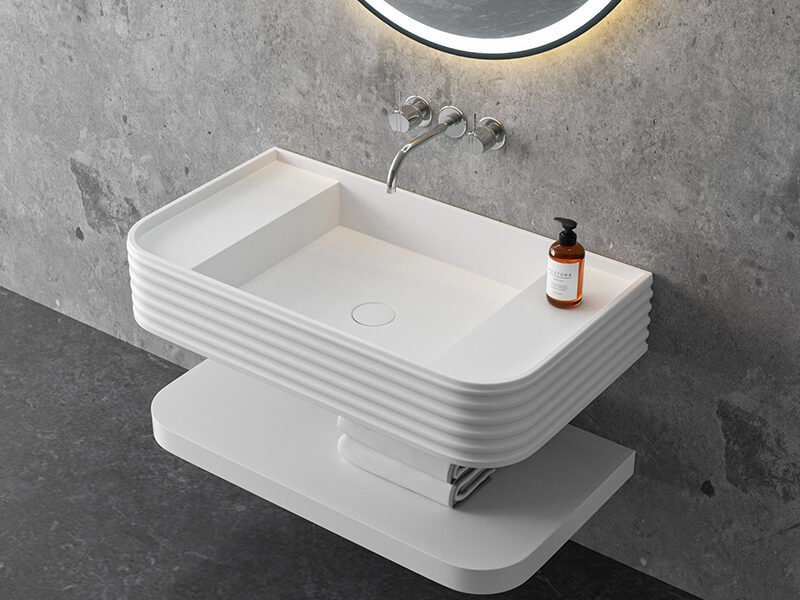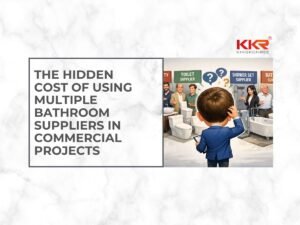When it comes to high-end bathroom design, material choice is a decision that impacts aesthetics, functionality, and long-term maintenance. Two of the most popular premium materials are Solid Surface and Quartz—both offering durability and a luxurious look, yet differing in composition, performance, and application.


Whether you are designing a luxury hotel suite, a boutique spa, or a high-traffic commercial washroom, knowing the strengths and limitations of each material will help you make an informed choice.
1. Understanding Materials
What is Solid Surface?
Solid Surface is a man-made material composed of acrylic resin, natural minerals, and pigments. It can be molded into seamless shapes, making it ideal for integrated basins, bathtubs, and shower walls.
- Versatility: Can be thermoformed into curves and custom designs.
- Seamless joints: No visible grout lines, reducing mold growth.
- Repairable surface: Scratches and stains can be sanded out.
For a detailed guide on its applications in commercial settings, see our A Complete Guide to Buying Solid Surface for Commercial Use.


What is Quartz?
Quartz surfaces are engineered stone, made from crushed natural quartz crystals bound with resin.
- Hardness: Quartz is more scratch-resistant than many other materials.
- Stone-like appearance: Mimics the beauty of marble or granite.
- Limited shaping: Cannot be thermoformed like Solid Surface.
2. Aesthetic and Design Flexibility
- Solid Surface offers unlimited shapes and seamless integration. Perfect for custom bathtubs (see Why Solid Surface Bathtubs Are the Perfect Choice for Hotel Projects) and bespoke basin designs.
- Quartz provides a natural stone look with richer patterns but is restricted to flat slab installations—best for countertops and vanity tops.
If you are comparing bathroom basin materials, you may also want to read Which Is Better: Solid Surface or Ceramic Basin?.
3. Durability and Maintenance
Solid Surface:
- Resistant to moisture and bacteria, making it an excellent choice for coastal or tropical locations.
- Stains can be removed with gentle sanding.
- Lighter weight than quartz—easier to install in high-rise buildings.
Quartz:
- More resistant to scratches and heat than Solid Surface.
- Requires less frequent maintenance but is heavier and more costly to transport.
4. Cost Considerations
- Solid Surface: Mid-to-high price range, but offers greater design flexibility. Ideal for mass hotel renovations where custom fit is important.
- Quartz: Usually more expensive upfront, especially for premium color patterns.
For large-scale projects sourcing materials overseas, check our Sourcing Solid Surface Products from China: A Guide for Global Buyers.
5. Best Applications
| Application Type | Solid Surface | Quartz |
| Integrated Countertop Basins | ✅ | ❌ |
| Custom Freestanding Bathtubs | ✅ | ❌ |
| Vanity Countertops | ✅ | ✅ |
| High-Heat Environments | ⚠️ | ✅ |
| Outdoor Installations | ⚠️ | ✅ |
6. Environmental and Hygiene Factors
- Solid Surface is non-porous and can be manufactured with antibacterial additives—ideal for healthcare and hospitality.
- Quartz is also non-porous, but its seams (in multi-piece installations) may require sealing.
For inspiration on integrating Solid Surface into trending designs, see 2025 Modern Bathroom Basin Trends: From Vessel Sinks to Integrated Designs.


Conclusion: Which Should You Choose?
If design flexibility, seamless aesthetics, and repairability are your top priorities, Solid Surface is the better option. For stone-like luxury, heat resistance, and low maintenance, Quartz is a strong contender.
For hotels, commercial bathrooms, and bespoke residential projects, KKR® Solid Surface stands out with 25 years of manufacturing experience, export capabilities to over 100 countries, and a proven track record in delivering custom basins, bathtubs, and wall panels.
👉 Explore more at www.kkrbath.com to see how Solid Surface can transform your bathroom projects.
FAQ
Q1: Is Solid Surface or Quartz better for humid climates?
Solid Surface is more adaptable in humid environments due to its seamless installation and easy maintenance.
Q2: Can Solid Surface be used outdoors?
Yes, but UV exposure may cause slight discoloration over time—ideal for shaded or semi-covered spaces.
Q3: Which material is easier to repair?
Solid Surface can be sanded and refinished on-site, whereas Quartz requires professional repair.
Q4: Is Quartz heavier than Solid Surface?
Yes, Quartz is denser, making it heavier and more challenging to install in high-rise or weight-restricted structures.
Q5: Why should I choose KKR for Solid Surface products?
KKR offers custom design, global shipping, competitive pricing, and proven hospitality project expertise.




